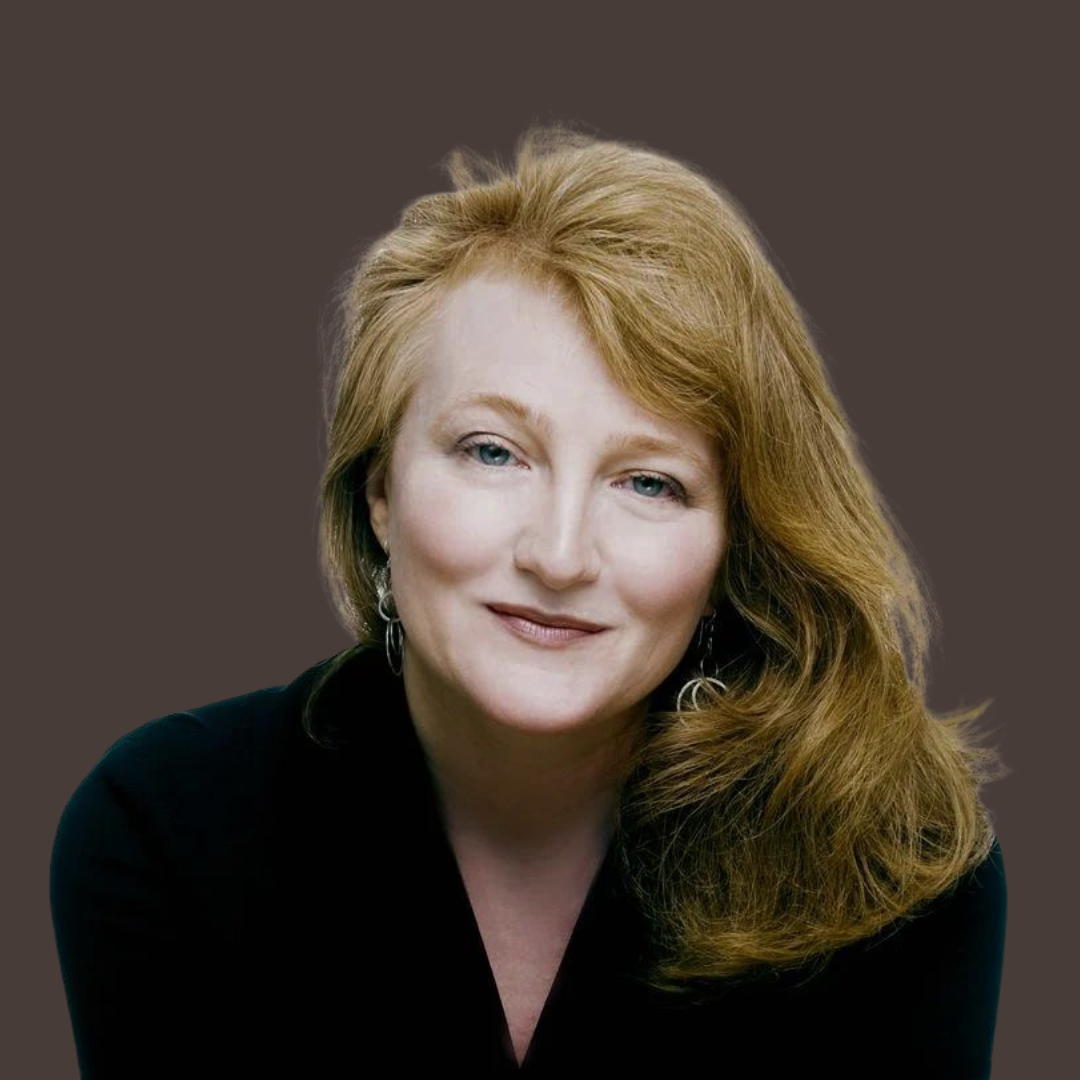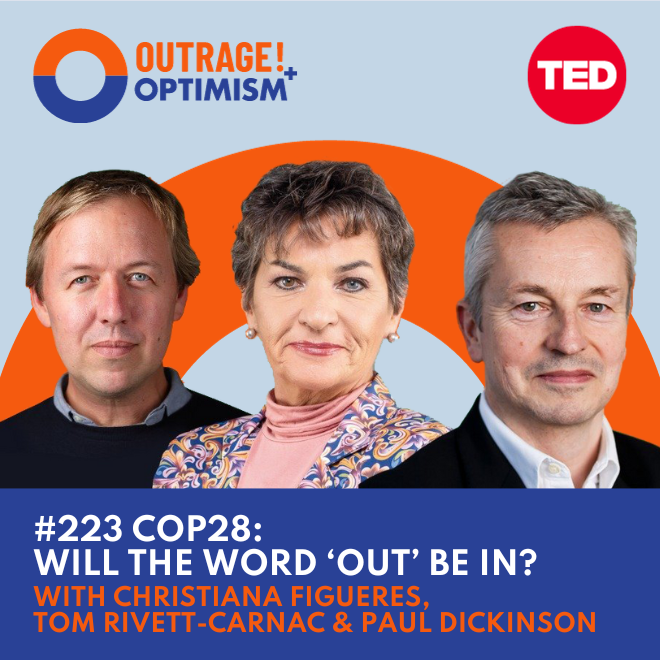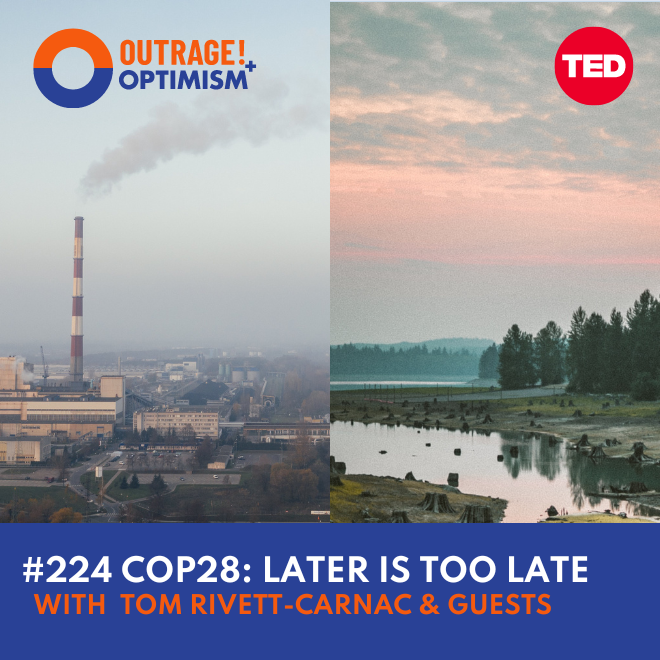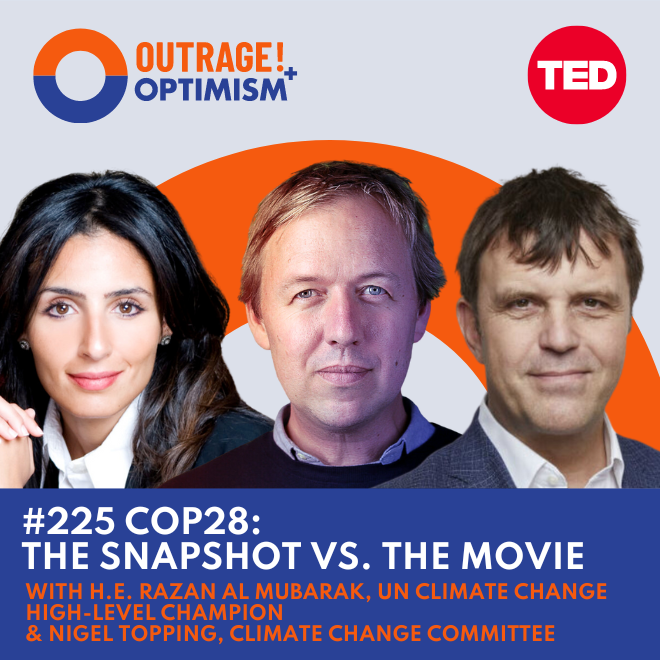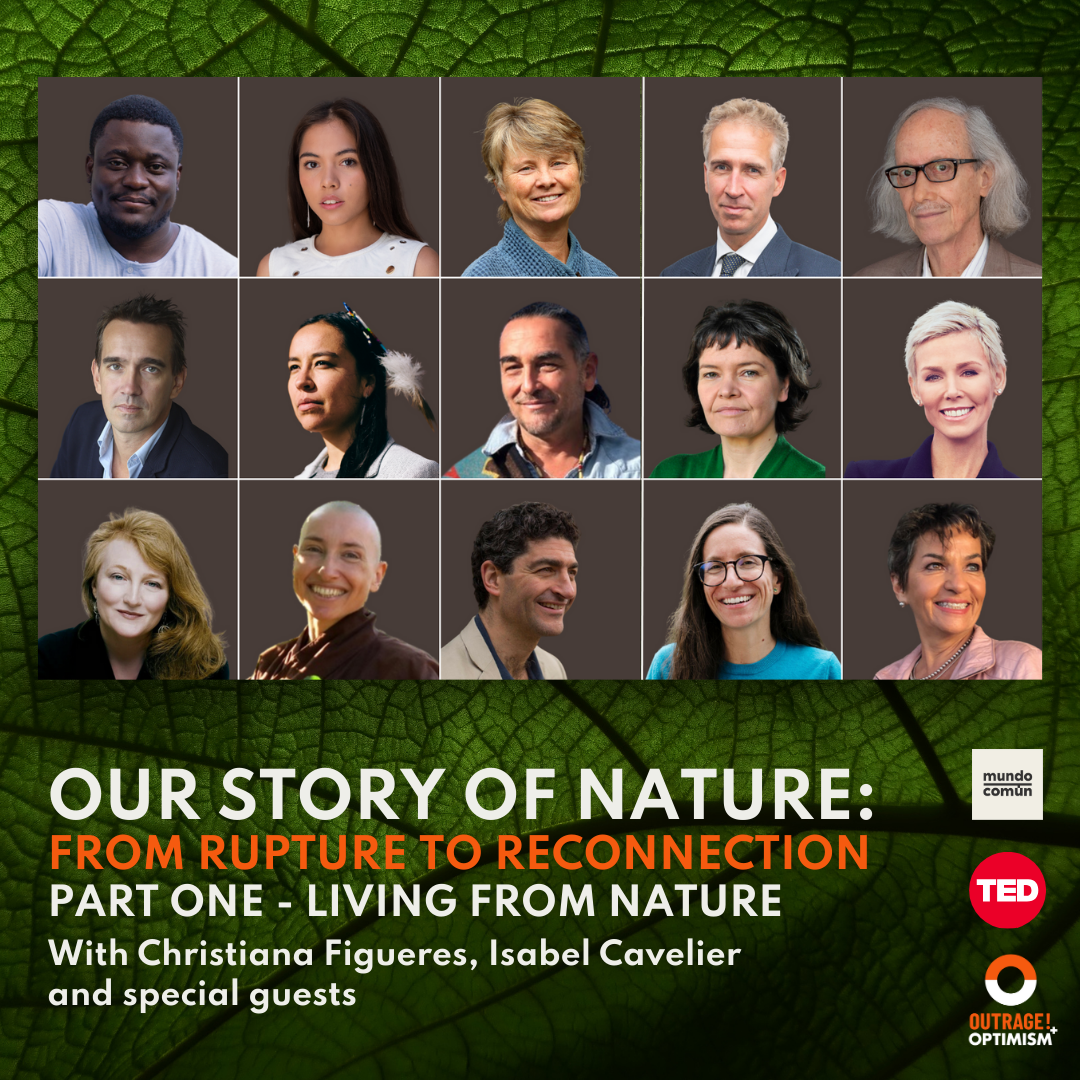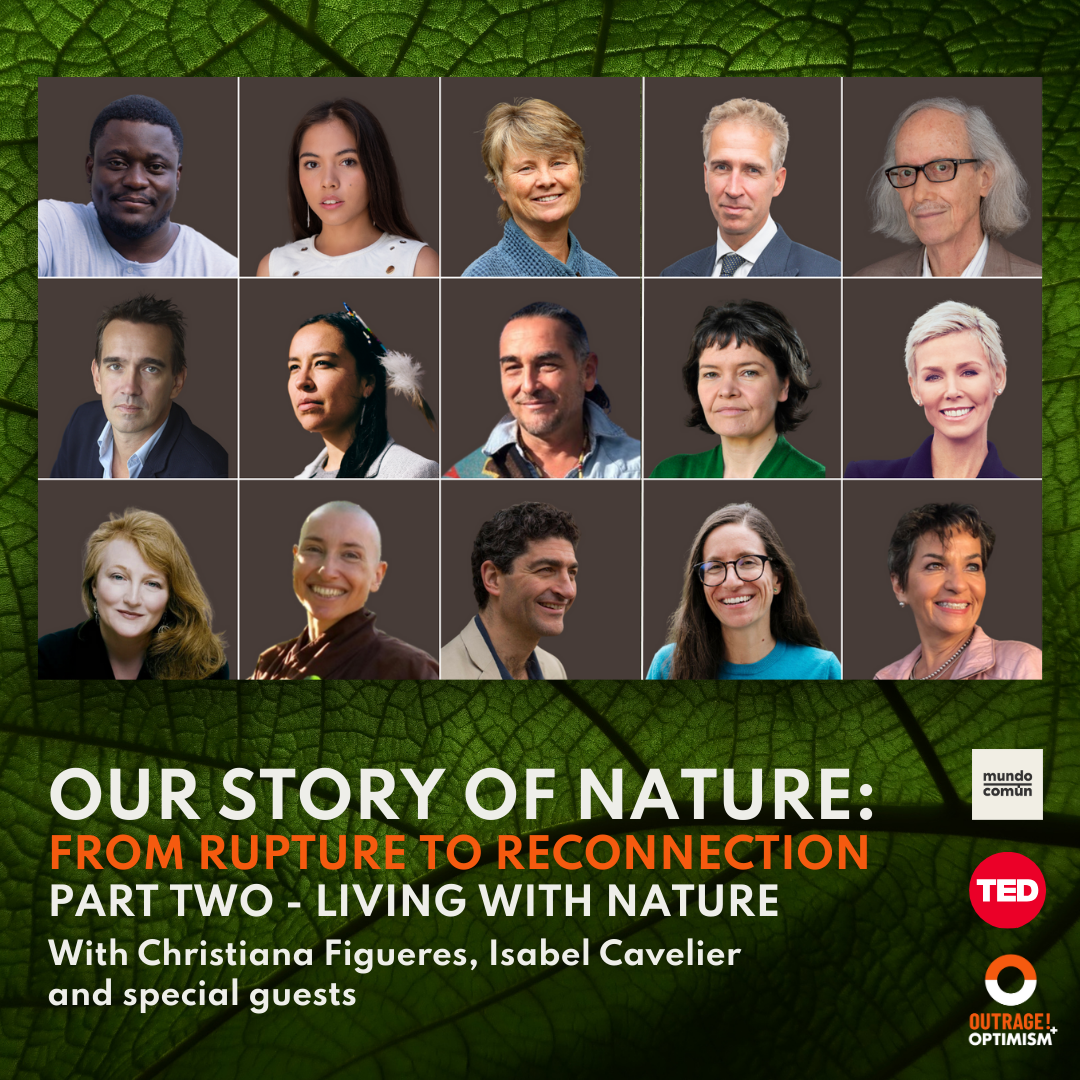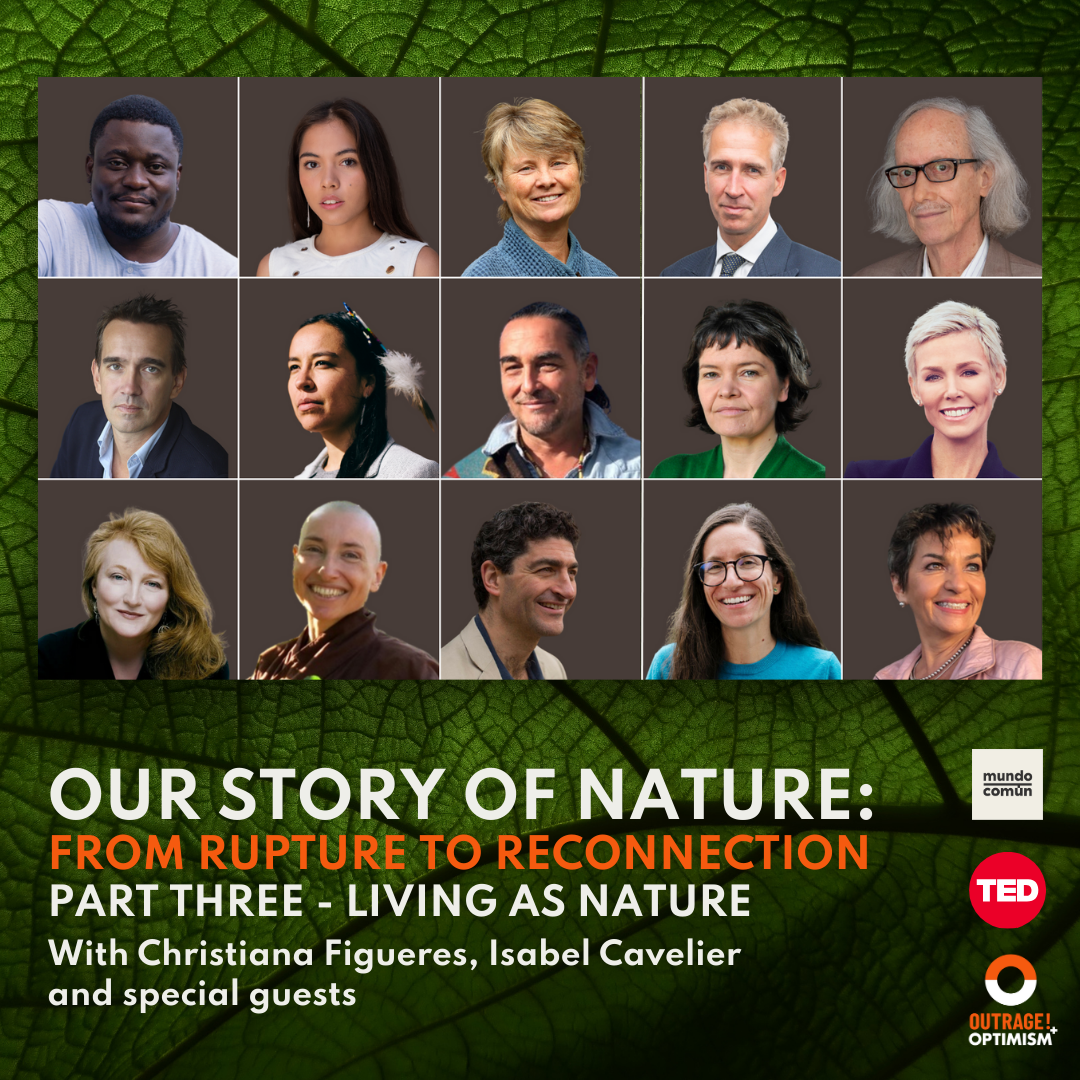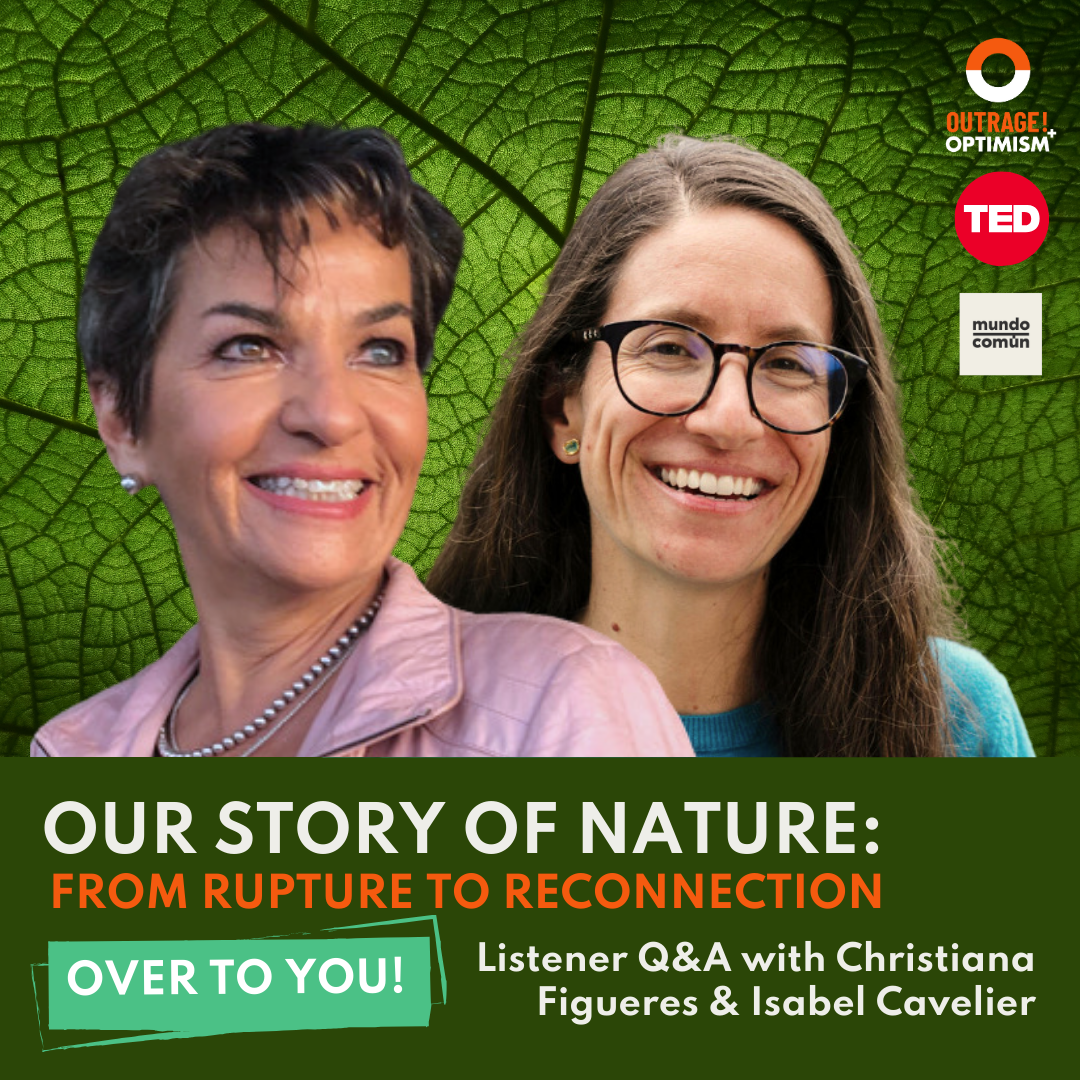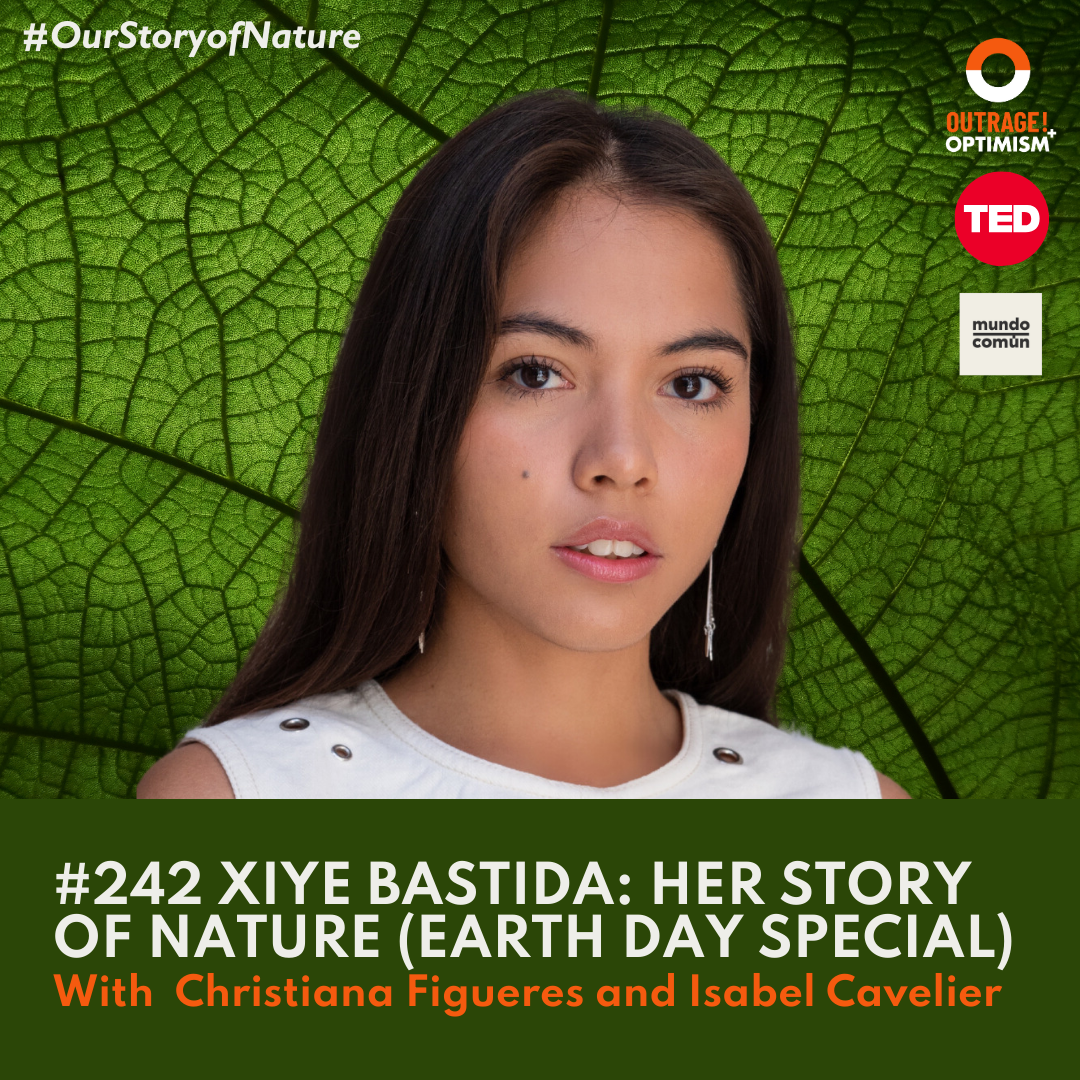239: Krista Tippett: Her Story of Nature
About this episode
In this week's special episode, while our team takes a well-deserved break, we're excited to present an exclusive, unedited conversation between Christiana Figueres, Isabel Cavelier Adarve, and the award-winning Krista Tippett, host of "On Being." Join us as we delve into "Our Story of Nature: From Rupture to Reconnection."
Take a moment to relax and immerse yourself in this expansive and inspiring dialogue. Krista opens up about her personal thoughts, feelings, and experiences with nature, offering a fresh perspective that's sure to leave a lasting impact. Get ready to see the natural world in a whole new light after tuning in!
Krista Tippett is a Peabody Award-winning broadcaster, New York Times bestselling author, and host of the acclaimed podcast "On Being." Renowned for her insightful interviews exploring the intersection of spirituality, ethics, and humanity, Tippett's work fosters meaningful dialogue and reflection. With her distinctive blend of curiosity and empathy, she invites listeners to engage in conversations that inspire deeper understanding and connection in today's complex world.
NOTES AND RESOURCES
GUEST
Krista Tippett, award-winning journalist, author and host of On Being podcast
Website | LinkedIn | Instagram | Facebook
For more unedited versions of our wonderful guest conversations from our recent mini-series Our Story of Nature: From Rupture to Reconnection please visit the dedicated Website page
Learn more about the Paris Agreement.
It’s official, we’re a TED Audio Collective Podcast - Proof!
Check out more podcasts from The TED Audio Collective
Please follow us on social media!
Twitter | Instagram | LinkedIn
Full Transcript
Transcript generated by AI. While we aim for accuracy, errors may still occur. Please refer to the episode’s audio for the definitive version
Christiana Figueres: [00:00:12] Hello and welcome to Outrage + Optimism. I'm Christiana Figueres, and there is no Paul and there is no Tom here today. In fact, this week, while we're all away from our mics, we're going to offer you a very special treat. Thanks for being here. You will remember that we put out recently a three part series on our relationship with nature. You might also remember that we let you know that we had full interviews with all of our distinguished guests. Well, this week we would like to give you the very special treat of the full interview with Krista Tippett. The links to the other unedited interviews are on our show notes. But now, Krista Tippett, in case you have not met her, she is a Peabody Award winning broadcaster and she is the anchor to the amazing podcast On Being, which, if you haven't discovered, you really should. Krista is a national Humanities medalist. She's a New York Times best selling author. And here's what's really interesting, after studying theology at the Yale Divinity School in the early 1990s, yes, that is last century. She actually identified what I would call a glaring absence of intelligent public conversation about the religious, spiritual, and moral aspects of our human life and our lived experience. So very courageously, she launched what was then a weekly national Public Radio show. Way back in 2003. She launched it on two radio stations. It then grew to over 400 radio stations in the US, and of course, has now developed into the wildly popular podcast On Being. Please enjoy this magnificent conversation with Krista Tippett. Krista, you always start your amazing, amazing interviews by asking people to connect back with their original relationship with spirituality. We don't necessarily need for you to do that, but we would like you to self introduce. How would you like to introduce yourself to our audience? Load More
Christiana Figueres: [00:03:40] You do indeed. On Being best podcast ever. Here is a huge shout out. Krista, so let's go, let's go into this vast conversation. You have had, I would argue at least a subset, if not the most important conversations that there are to be had with some of the most enlightened and thoughtful, deeply thoughtful people. And so you must have by now harvested quite a bit of insight, both from others as well as what is emerging from you about the story of the human relationship with nature. And we would love to start this conversation by hearing you crystallize for us, how do you understand when and where and how did we humans lose connection, dissociate, dislocate from both the natural world, from ourselves and from others as a package?
Krista Tippett: [00:05:00] Well, it's obviously a huge question, and I know you have people who've studied various histories within that history. I think, you know, I just want to say this, I spent time this past summer, on a in one of the most beautiful places I've ever been, Cortes Island in British Columbia. And there are so many, so many, so many beautiful places on this planet Earth. And I kept having this experience of just standing there, taking it in and just wondering how it is that we humans did not see what was around us and just be in a state of wondering and adoring and act accordingly. Because that's not what we did. We the big we, certainly not in, I mean, I know you can take this story very far back to agriculture, but I think what I'm what I'm the story I'm aware of myself being placed in is, you know, the industrial west, the post-enlightenment world, and even growing up in the middle of America in the 1960s and 70s, where, you know, the invention of food coming out of boxes and cans was considered to be great innovation. And there's nothing more elemental than the food we eat right then as a, as a, as emblematic of our relationship to the entire natural world. And I understand now, but did not understand then that I grew up with such a distorted relationship to that.
Krista Tippett: [00:06:49] I think I've also been, you know, I grew up in a really Christian upbringing. And I've also been very interested in how, you know, a very particular interpretation of the Genesis story in the Bible, you know, if you need examples of how ideas and words shape the world, this very particular interpretation of these stories, you know, in fact, of the very first story in the Bible, which actually is more like an epic poem than like a piece of prose, and it's certainly not a history lesson, wasn't written that way. Which had which sent human beings forth to dominate and subdue. And that's actually not what those words and what that poetry meant in its inception. But that's how it was internalized, and that's how we have behaved. And it is such an estrangement. As much as anything from ourselves, right. Because we are not in the natural world. We are of it. But as you say, I mean, it is such a strange thing about human beings. That some of them things that we most need to learn to grow wise and to grow up are things that we've known forever in our bodies. But then we finally know with consciousness for the first time. And this is one of those elemental realities about us.
Christiana Figueres: [00:08:30] What do you mean, know with consciousness?
Krista Tippett: [00:08:34] I mean like that we inhabit, you know, the truth about us is, as I say, that we are part of the natural world. We are creatures among creatures. Other, we are also not separate, right. I mean, I'm alone and I'm never alone. These are deep truths. The way physics understands deep truth, a deep truth, is that if you if it is a deep truth, its opposite is also true. And we are individuals, those of us looking at each other now, speaking, hearing each other and we're not. And yet, you know, there are all kinds of things we're coming to understand about how our brains work and how our bodies work, that help explain how these perceptions have helped us navigate the complexity of reality and move through the world and feel safe. But our ability to perceive the fullness of reality is limited as much as it is enabled, it is limited by our senses and by our brains that are working so hard to keep us safe. And these are things that have always been true and our bodies have known them. But we're just at this moment where we're coming to, some of us really apprehend that and act accordingly.
Christiana Figueres: [00:10:09] Krista, what about the relationship between language, the evolution of language, the richness of language, what would you say, how do you focus on the relationship between language and the beliefs that we entertain and that we act upon and from the, the internal cosmology that we have that determines how we turn up in the world?
Krista Tippett: [00:10:38] Well, you know, first of all, I think that words are some of the most powerful tools that we possess. And they are so ordinary, we live with them, we work with them. They they flow out of us all day long. And we often are unaware of how much they, they work in the world right. And you know, we and I you know, we know that our we know that words can be weapons and you know, with my words I can make someone else's day. I can break someone else's day. And what I also know, one of my strongest held convictions, is just, you know, the ancient rabbi said words make worlds. And that is my observation right. So that's why it really matters when we use language of domination and of subduing that, that language shaped our relationship with the world of which we were part. I, and I carry that also as a, as a source of, of hope right. I really think that every time we, we work with our words and take care with our words, you know, we can literally bring new realities into being. That is one way to start. You know, I don't know if this is kind of maybe jumping ahead, but one of the things I've been doing recently, I mean, it is connected, is talking to people who are, there's such incredible science as you know, of, you know, how forests work.
Krista Tippett: [00:12:23] And like, I would say, how vitality, one of the things we're coming to understand with science that again, peoples across time have known, but science in a way denied, you know, it's just how the nature of vitality, and, in, in a forest, in a body, and one, I've been collecting words that are actually have vitality functions, and they couldn't really be more different from the kinds of words and concepts with which we've structured the Western world right. So I was just looking at I put this list down before we got on thinking, you know, entanglement, reciprocity, tributaries, dying, composting, regeneration, mutation, underground life support, nutrient cycling and recycling, detoxification, photosynthesis, biodiversity, germination, flowering, recombination, efflorescence, endosymbiosis, right. How have we structured our world around hierarchy and domination and the myth of a strategic plan and of solutions. And you know, if you think about just the difference between, entanglement or, mergers right. So I just think like these are words. They are words that don't just describe the truth about reality that we haven't factored in to how we've lived, but they, they also, these kind, this kind of language, will also shape imagination, and imagination shapes what we bring into being or what we fail to bring into being. That's kind of a long winded answer.
Christiana Figueres: [00:14:33] Love it.
Isabel Cavelier: [00:14:34] That's you answering our questions on the past, present, and future all at once, and it will come to you as a surprise Krista, the genesis of this mini series was at Cortes Island.
Krista Tippett: [00:14:48] Oh my gosh, really?
Isabel Cavelier: [00:14:50] After having spent time, you know, truly having a dialogue with those purple sea stars and those trees growing from old.
Christiana Figueres: [00:15:02] With Azita, right there.
Isabel Cavelier: [00:15:05] Literally.
Krista Tippett: [00:15:06] Was this at the retreat with Plum Village?
Christiana Figueres: [00:15:09] Yes, yes.
Krista Tippett: [00:15:10] I had no idea.
Isabel Cavelier: [00:15:13] So the universe is perfect and there are all of these interconnections. And I was going to ask you about science. You already touched on it, but I think it would be a beautiful segue between all of that disconnection and how that scientific paradigm has acted upon us, and the language we use, and the type of approaches to reality that come from that mental way of organizing our own perception of reality into how you see us now and how you see that evolving. Because science, the scientific method is a method. It's a worldview. And it has become so much more than that. And again, now, as we are throwing ourselves into the future or better, I like saying we are trying to pull that future into the present, how do you see that line of how science has been that weapon of dominance, of colonization, of mechanization, of reality, but is now also showing how trees talk to each other and how entanglement actually works. So what are you how do you see that evolution? And maybe through that what are you seeing bloom? What are those little, little plants that are from the future but that you have seen already now that you're feeling that the vitality of those little seeds that you think are germinating now?
Krista Tippett: [00:16:45] Yes, one of the most beautiful things about being alive now is how science is becoming a companion for a greater consciousness, a consciousness that both brings us forward and brings us back right. Like again plants us in the reality that we've become alienated from. And yes, it's absolutely, you know, it's Suzanne Simard's work on, on the life, you know, the underground life of a forest. That is really a template for, community, for vitality, and, you know, so much, so much else, kind of in, in that sphere of understanding the natural world. Also, I feel that there's a complementarity emerging between how we're learning or, you know, how we're learning to just see the sentience of other living beings, of plants and animals, and also how we're understanding ourselves right. So and so I think and I think some of this what, what feels exciting to me might not it doesn't look linear, but it's, it's very it's all very it's there's a great companionship and conversation. So for example, you know, Dacher Keltner who's working with the science of awe, you know, this is not the kind of thing that science, Western science has taken seriously.
Krista Tippett: [00:18:22] But to understand the experience of awe as something that, actually is one of the most life giving experiences that we have and, that it, it has all these physical, immunological, nervous system effects on us and, and what feels so important in the context of this conversation we're having is, of course, the experience that, that so many of us just organically have in the natural world is that awe experience right. And, you know, there's language of collective effervescence, that we can also literally that our bodies sync up in certain situations, that we that we have a physical experience that means our hearts are beating at the same time and our breath is in unison. When we put ourselves in the presence of awe. And also there's language in that science of, a very astonishing thing, I think, in contrast to what you might read in the newspaper today about how the world looks and this, this, these generalizations we can draw from the way journalism has also functioned, which has been about pathology. You know, medicine has been about pathology. There are reasons for that that have to do with our fear instincts.
Krista Tippett: [00:19:54] But I think we're learning kind of one field at a time to move out of that. And, yeah, so, one of the main sources of awe that these scientists found all over the world, in many countries, many languages, making sure that they weren't just studying a certain kind of person was, how moved and elevated we are by what they called moral beauty, which is also the ordinary experience we human beings have of the beauty of other human beings, of the generosity of other lives, of the capacity we have, although it doesn't make the news to rise to our better selves to learn. And so, and us internalizing, not just what goes wrong, which is true, but the fuller story, of our capacities of what we are learning, of how we are growing, that is such a critical muscle for us to face, our ecological present and future right. That's a critical muscle for us to, have the kind of the muscular hope that we need and the, and the imagination that is required, to really bring about a different world and nothing less is called for.
Christiana Figueres: [00:21:23] And Krista, let me take you one step deeper into that. Where do you see science, spirituality, what we sort of understand under spirituality and indigenous wisdom, where is the intersection there?
Krista Tippett: [00:21:40] Well, it's, you know, it's, it is a thread. I don't think we could, name any scientist who is really revolutionizing our understanding of something without, you know, I'm thinking of, and I'm not going to be good at, you know, thinking of all the names. I'm bad when you say, tell me this name.
Christiana Figueres: [00:22:03] No no, just conceptually the intersection.
Krista Tippett: [00:22:05] Yeah, conceptually, whenever there are these breakthroughs in understanding the bedrock notion of vitality, this was understood in indigenous cultures, right. That always brings science, the scientists and the science back to people who knew this all along and their voices weren't listened to, and were often, violently suppressed, but there is this, this reconnection and this, this new, you know, willingness and ability to honour finally, belatedly, this wisdom that has been. And you know, it's not just wisdom. I think even calling these wisdom traditions has been a way, perhaps, to keep them in a compartment right. This was true pragmatic knowledge right. I just recently interviewed somebody here named Baratunde Thurston, who's doing this program on the natural world, and he talked about going to Death Valley here in California for one of their programs. And, you know, Death Valley was named after, as he said, white people who didn't listen to the people who lived there and got in trouble, and somebody died, right. Somebody died because they weren't they were stupid and they didn't ask for help, and they didn't pay attention to how things work. And so this place ever after was called Death Valley, which of course is going to shape again, how do words shape us. What you imagine when you imagine it. And it is a place that is full of life, right. And of people who have lived there consistently across time and tended it. And it's full of great beauty. And so that those, those connection points are, you know, they're regenerating. Is it happening, is it happening powerfully enough, is it happening quickly enough? Yeah, maybe not.
Isabel Cavelier: [00:24:16] It will be beautiful to talk about speed and time and how the different times interconnect. But before that, I would like to ask you about healing and how in that interconnection, there's also quite a feeling now that there's a diversity of healing methods and practices that are arising. There's all the alternative medicine, holistic approaches, psychedelics, mystic and traditional knowledge all combining with, also, we've never been so advanced in medical science to keep human bodies alive and better and living well. And there's indeed so much that feels that needs to be healed. How do you see that movement towards healing, and in particular, the deeper healing of that relationship with ourselves as nature?
Krista Tippett: [00:25:14] Yeah. Well, first of all, I've talked to a lot of people in these years about the difference between curing and healing. And, and Western culture is, you know, very focused on fixing and that actually doesn't, that doesn't allow us to see ourselves as whole. And to honour the strange reality that we human beings, very often grow and learn through what goes wrong. And, that the things that, we would call our weaknesses or, or the hard places in our lives, you know, we're we are often made by what would break us, which is also something that I hold on to in this time, in the life of our world. So moving from that, and I think the other thing that occurs to me with that is we're just learning the fiction. And this kind of gets back to the question of spirituality, what a fiction it has been, which was just the limits of our understanding, at least in Western medicine, that, you know, that there's if you just think about this language of body, mind, spirit that I grew up hearing, it's just a nonsense phrase because the more we learn, you know, emotion is, is lodges in our bodies, trauma lodges in our bodies, healing, what we have called mental.
Krista Tippett: [00:26:48] You know, we're learning that it's possibly that the gut is a second brain, right. That essentially there's just total interactivity. It's impossible to distinguish between what is physical, what is mental, what is emotional, and all the things that we mean when we use the word spiritual, all of that is of a piece. So I think we're learning. To me, this is the great frontier, right. The possibility of wholeness, of becoming whole, which is healing and not curing, right. Which takes all of our vulnerability in and the fact that we need each other and that we must belong and that we must share, and that we learn through what goes wrong, that we are not perfect, but we can be, you can be, we are imperfect and we are vulnerable, and precisely in that state, we can be healing and we can be whole. That to me, is language that, in a notion and imagination of perhaps, you know, a way to make sense of what it is that we're striving for with all of this new, this new slash old understanding.
Christiana Figueres: [00:28:17] Krista, let's go one, one step beyond that, it is now the year 2073, not 23, 73. How would you describe how we humans are interacting with the rest of the web of life, with all nonhumans, with all what we incorrectly call inert nature. How, what is what's the vision, what is the aspiration for the future?
Krista Tippett: [00:28:57] The aspiration. I think the aspiration is that we have grown humbler, right. That that wholeness also has humility in it. Humility is not about debasing ourselves. It's about, seeing the beauty and what is to be honoured in, in others and and not just other humans. So that we have, we have that we that that our that our humility is, is a is a form of gracefulness. That we are better at listening and learning, from other beings, not just other humans. And less. focused on, telling and organizing and fixing in our image, which always just creates a whole new cascade of problems. I mean, that's how we've behaved to the other, all of the others.
Christiana Figueres: [00:30:16] All of the others.
Krista Tippett: [00:30:17] Yeah
Christiana Figueres: [00:30:18] And it's a long list of others.
Isabel Cavelier: [00:30:20] It's a long list. I don't know if you were aware that the word humility has the same etymology than the word hummus, that is what comes out of compost.
Krista Tippett: [00:30:35] Yes.
Isabel Cavelier: [00:30:35] As the renewed earth, the most nurturing soil.
Krista Tippett: [00:30:40] I have not, but I do love that root of hummus, human, this earthiness. And I love humility being part of that.
Christiana Figueres: [00:30:58] Intertwined.
Isabel Cavelier: [00:31:00] What would be a good question you would ask Krista, since that is your art, we would ask ourselves from our future selves to today?
Krista Tippett: [00:31:12] Ah, it's such a good question. What I would ask my future self or what my?
Isabel Cavelier: [00:31:17] No, what your future self, what our future selves would ask our present selves?
Krista Tippett: [00:31:24] Yeah. I don't, I, you know, I, I feel that the question I'm, the question I'm, struggling with now and I feel like a lot of us are struggling with is precisely where I need to be orienting my attention and my intention. But, you know, I believe as much as I believe in the power of words, I believe in the power of questions. And so I actually think the way to begin with, an existential, life giving question like that is to hold it. To actually take that question as a companion and commit to having it in my ear, you know, with me and seeing what it shows me and seeing what it leads me to and what it shows me to turn away from. And so maybe my future self would ask me to take my own advice, because I think that question of especially with the huge challenges that we're talking about here, you know, that question can just be so discouraging because it's impossible to think about not just where to begin, but what kind of dent can you make. So could I just let that question be my teacher.
Christiana Figueres: [00:32:43] Krista, you have what I would call a lifelong love affair with words and that is exemplified in your beautiful, beautiful questions that you ask all your guests, but it's also in exemplified in your love of poetry. And we were wondering if you have a poem that you might want to share, because we would love to hear you read poetry.
Krista Tippett: [00:33:17] You know, you mentioned to me that you might ask me this, and I, I came up with two, one of them is shorter, and it's a Mary Oliver poem, and I'm.
Christiana Figueres: [00:33:30] Of course.
Krista Tippett: [00:33:31] I'm not sure, I'm not exactly sure, I feel like, why did why was I drawn to this. I'm just going to read it for you and then I'll read the other one is, yeah. This is from a one of the books she wrote very late in her life, and her poetry got more and more spare, I think she just had so much clarity and so many words were not needed. But she she wrote, I was enjoying everything. This is called drifting. I was enjoying everything, the rain, the path, wherever it was taking me. The earth roots beginning to stir. I didn't intend to start thinking about God. It just happened. How God or gods are invisible. Quite understandable. But holiness is visible entirely. It's wonderful to walk along like that. Thought not the usual intention to reach an answer, but merely drifting like clouds that only seem weightless. But of course are not are really important. I mean, terribly important. Not decoration by any means. By next week, the violets will be blooming. Anyway, this was my delicious walk in the rain. What was it actually about. Think about what it is that music is trying to say. It was something like that. Holiness is visible entirely.
Christiana Figueres: [00:35:03] Holiness is visible, yes.
Krista Tippett: [00:35:05] Is visible entirely. And I also just feel like somehow what she evokes there is an experience that is so ordinary to have just being in this world and walking through it. And when we can just let ourselves take it in. And what is what is music trying to say, right. Which is about the mystery and the beauty of being in these bodies and being these strange creatures. This other one is, it was read to me in an interview with Ayana Elizabeth Johnson, who's a marine biologist, another young scientist who's doing amazing work asking, what if we get this right. What if we orient around that question in science and in culture. And she read this poem by Ayesha Siddiqa, which is called On another panel about climate, they asked me to sell the future and all I've got is a love poem. And this young woman is 24, 25. So I feel as somebody who is at the other, you know, at another end of the age spectrum, one of the questions I think my future self is asking me is, is how do you walk alongside a young woman like this? What, you know, she knows things I don't know. She sees things and can do things I can't see. But I've been in a body for a longer amount of time, so how can my presence just be a companion to her, and people like her. She wrote, what if the future is soft and revolution is so kind that there is no end to us in sight. Whole cities breathe and bad luck is bested by a promise to the leaves. To withstand your own end is difficult. The future frolics about. Promise to no one as is her right. Rage against injustice makes the voice grow harsher yet. If the future leaves without us, the silence that will follow will be an unspeakable nothing. What if we convince her to stay. How rare and beautiful it is that we exist. What if we stun existence one more time. When I wake up, get out of bed, my seven year old cousin with her ruptured belly tags along, then follows my grandmother, aunts, my other cousins, and the violent shape of their drinking water. The earth remembers everything. Our bodies are the colour of the earth, and we are nobody's. Been born from so many apocalypses, what's one more. Love is still the only revenge. It grows each time the earth is set on fire. But for what it's worth, I'd do this again. Gamble on humanity 100 times over. Commit to life and to life as the trees fall and take us with them. I'd follow love into extinction.
Christiana Figueres: [00:38:22] I've heard that poem before, it is just so beautiful. But, Krista, you know, you don't read poetry, you sing poetry.
Krista Tippett: [00:38:31] Thank you, that's a lovely thing to say. This poem I don't think you can hear too much. I just, I thought.
Isabel Cavelier: [00:38:39] No, no.
Krista Tippett: [00:38:41] Yeah.
Christiana Figueres: [00:38:42] No, and we were so privileged to spend time with her and watch her frolicking up and climbing into trees and, you know, doing all kinds of, of wonderful enjoyment of her environment and our environment. Well, Krista Tippett, this has been a true, true, deep pleasure, thank you, thank you so much.
Isabel Cavelier: [00:39:03] Thank you.
Christiana Figueres: [00:39:04] Thank you for sharing, so deeply and so meaningfully and with such ambition.
Isabel Cavelier: [00:39:13] And with such humility, beautiful.
Krista Tippett: [00:39:17] It was such a joy for me, too. I'm so glad to know that you're out there and that we are in kinship.
Christiana Figueres: [00:39:23] We are indeed.
Isabel Cavelier: [00:39:24] We are.
Christiana Figueres: [00:39:24] We are indeed. Always have been, always will be.
Krista Tippett: [00:39:27] That's right, now I know it with consciousness.
Christiana Figueres: [00:39:30] Yes, exactly, exactly, exactly. Krista, thank you so, so much. Thank you very, very much. We want to be respectful of your time, so thank you.
Isabel Cavelier: [00:39:41] Yes.
Krista Tippett: [00:39:41] Blessings, blessings, yes.
Isabel Cavelier: [00:39:43] Blessings back.
Krista Tippett: [00:39:44] In gratitude.
Your hosts

Christiana Figueres
 Follow Christiana Figueres on Instagram
Follow Christiana Figueres on Instagram
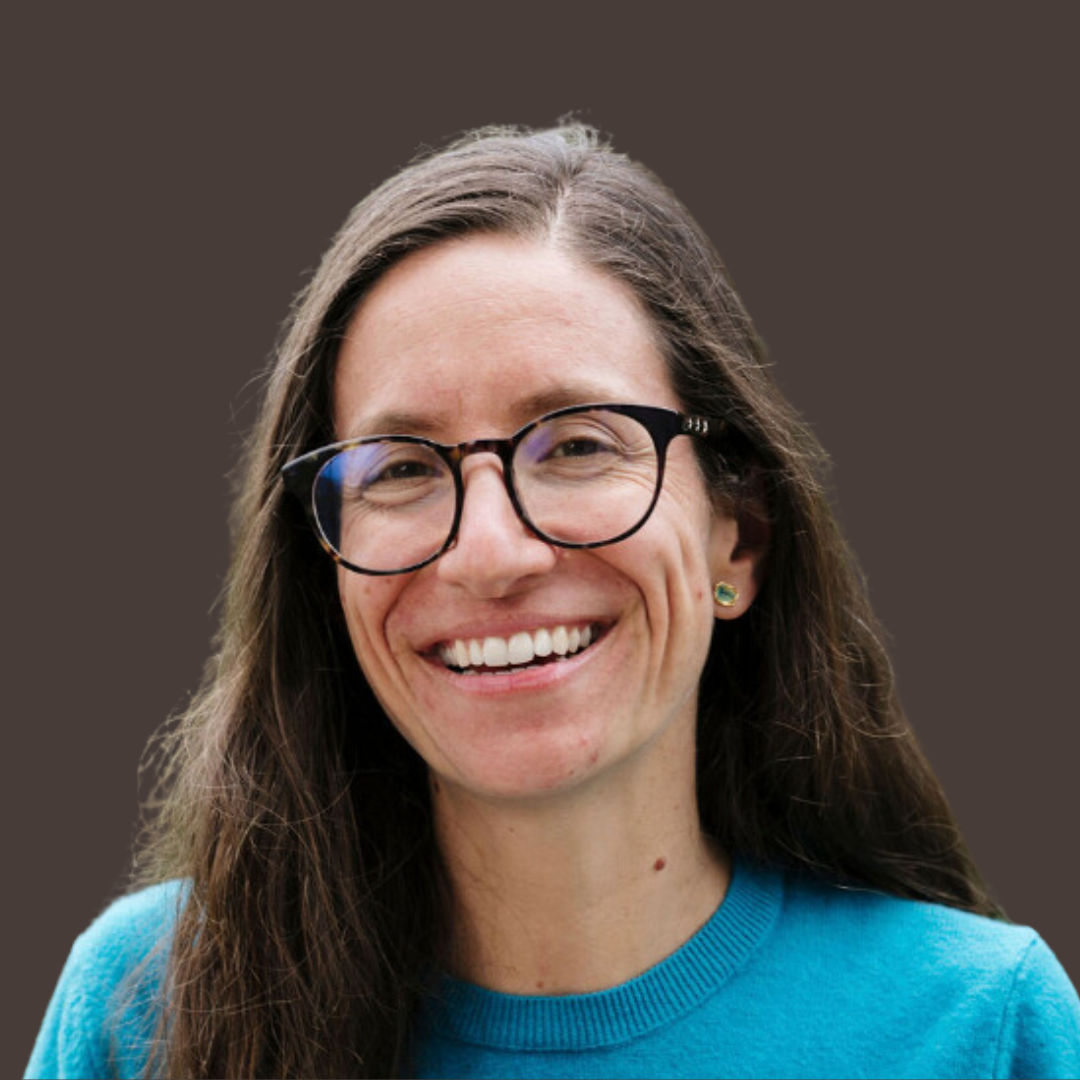
Isabel Cavelier Adarve
Guests
